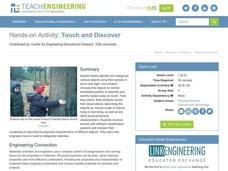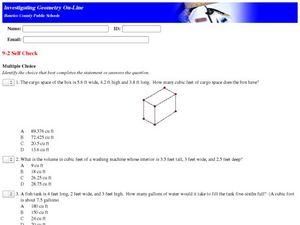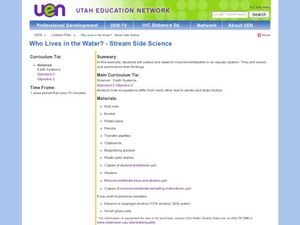Curated OER
Touch and Discover
Pupils work together to identify and categorize objects. They have to identify the object on touch because they are blindfolded. They record their data and describe the objects once they can look at them.
Curated OER
Creatures of the Ocean
Second graders examine the characteristics of a specific ocean creature. In pairs, 2nd graders create a graphic organizer to list categories and supporting details of the ocean creature. Students review data and use it to write a report...
Curated OER
Goobers. Goobers? Goobers!
Students begin the lesson by noting the many ways in which to use peanuts. In groups, they use the internet to research the work of George Washington Carver. They discover the allergies and nutritional information of the peanut and...
Curated OER
Exploring the Lighthouses of North Carolina!
Fourth graders gather information from the web about the lighthouses of North Carolina. They create a database and project about these historical landmarks.
Curated OER
Leonardo da Vinci: Artist, Scientist, Inventor
Students explore the connection of art, science, and history during the Renaissance Period. In this art lesson plan, students watch a PowerPoint presentation with examples of da Vinci's work. To finish this lesson plan, students...
Federal Reserve Bank
Banking on Debit Cards
What are the advantages and disadvantages of using a credit card versus a debit card? What are the costs of using a debit card irresponsibly? Here you'll find a lesson plan on key concepts that every learner should know...
Curated OER
Three Little Pigs and Heat Transfer
Students use the Internet to research the ancient practices of building structures and to help them recognize what building materials serve as good conductors and insulators of heat. They build a structure using straw bale walls.
Curated OER
Route 66
Students research the Internet to locate information about the Route 66 Festival. They focus on the history of the route in Illinois and create a web page of information.
Curated OER
Volume
In this volume learning exercise, students determine the number of cuboids needed to create a rectangular prism of a particular size. They determine the mass, volume and density of cereal boxes. Students determine the volume of...
Curated OER
100% Recyclable
Seventh graders research recycling activities at schools across the country using e-mail. They research the waste management and recycling program at their school and problem solve to create an environmentally sound program for the future.
Curated OER
The Seed Connection
Second graders investigate the best conditions for growing plants while considering how math, science, and technology are interrelated in this study. They partner with an upper grade through the use of the Internet and conduct a...
Curated OER
Lets Get the Story Out There
Students design their own service learning project based on a survey given to the community. They examine the data they collect and interview directors of foundations in their area. They write a paper about which foundation they have...
Curated OER
Dissolved Oxygen and Photosynthesis: 1
Young scholars are taught that plants produce oxygen underwater, and they design an experiment that test this question. They discuss whether plants give off oxygen, and how to measure this. Students measure the increase in dissolved...
Curated OER
Trip to the Greenbrier
Tenth graders explore the Greenbriar Resort. In this budgeting lesson, 10th graders plan and calculate the cost of trips from their home to the Greenbriar Resort.
Curated OER
Watershed Documentary
Students research and produce an iMovie documentary about the human and natural history of a stream basin (watershed).
Curated OER
Who Lives in the Water? Stream Side Science
Andree Walker thought of everything when he wrote this resource. It includes a detailed list of materials and background information links for the teacher. In addition, it has procedures, a macroinvertebrate identification key, and tally...
PHET
Planet Designer: Retro Planet Red
What does the atmosphere on Mars look like? This fourth lesson in the series of five is designed for high schoolers. Scholars apply previous knowledge to add atmosphere to Mars in an online simulation. This comprehensive lesson includes...
Curated OER
Excel, Word, and Basketball
Wow, this lesson packs a punch. Pupils interview basketball players, write about a game, and use Excel to organize statistics related to the players and the points scored. Afterward, they create posters, presentations, and much more.
PHET
Planet Designer: Martian Makeover
Mars used to have liquid water, can you make it come back? Use the lesson and simulation to understand why Mars lost its magnetic field, why atmosphere is important, and what gravity has to do with it. This is the third lesson...
PHET
Planet Designer: What’s Trending Hot?
Excite scholars to design their own planet in this first of five lessons. The lesson starts with a pre-activity assessment, a complete lesson plan that is easy to implement, and a post-activity assessment that would look great...
National Wildlife Federation
What is DBH?
When measuring the circumference of a tree, does it matter how high you place the measuring tape? Most scholars have never considered this question, but scientists know that measurement techniques must be standardized. The 13th lesson in...
Curated OER
The Effect of Natural Selection on Genes, Traits and Individuals
Rotating through five stations, evolutionary biologists explore the question of how changes in DNA facilitate the changes in a population over time. High-quality, colorful cards of animals, skeletons, skulls, and DNA sequences can all be...
Curated OER
Math News
Young writers design and publish a newsletter with articles that demonstrate knowledge of mathematical concepts. They explain mathematical procedures and basic operations in a news article format. Next, they compile several articles to...
Curated OER
Here a Bug, There a Bug
Students explore insects and discover that insects found in different parts of the country have characteristics that can be observed and described.

























